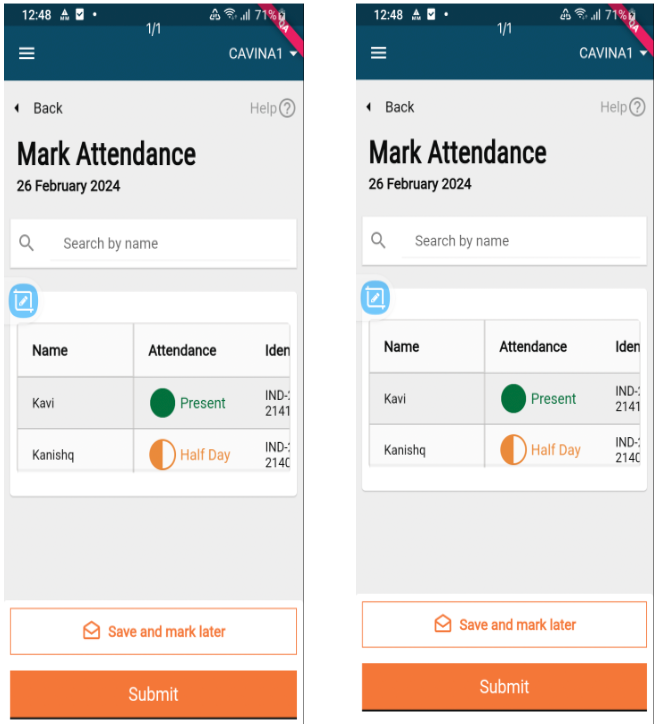Attendance Management
Overview
The attendance feature enables supervisors to manage and mark the attendance of field staff (attendees) during the campaign period. Attendance can be tracked daily, ensuring accountability and performance monitoring throughout the campaign.
Role Involved: DISTRICT_SUPERVISOR
User actions
This module has 3 associated screens:
Manage Attendance
Date and Session Selection
Mark Attendance
Workflow Details
1. Manage Attendance
Supervisors can view the attendance registers assigned to them.
Registers are created manually by mapping a project and the supervisor/staff members.
Attendance Completion Logic:
The system checks attendance logs for each session (entry and exit).
If logs match both session times, the individual is marked Present.
If logs are missing or incomplete, the individual is marked Absent.
The system generates a list of completed dates using
generateDateList.
.
Data Field to Manage Attendance Screen:
Campaign name
Name of the campaign.
Event type
Type of event where attendance is done, that is training or distribution.
Start date
Start date of the campaign.
End date
End date of the campaign.
Status
If the end date is passed, the status will be inactive, or if the register status is inactive, the status will be inactive, else, the status will be active.
Staff count
Number of attendees in the register.
Attendance completion
Shows the number of days for which attendance has been submitted submitted to the server.
2. Date & Session Selection
Attendance can be marked for any date between the register’s start date and the end date (or today’s date if before the end date).
If attendance is already submitted for a date, the option changes from Mark Attendance to View Attendance.
Missed Attendance Logic: The system compares submitted dates with the register timeline to identify missed dates.
3. Mark Attendance
Supervisors can record attendance twice daily (entry and exit) by default.
Possible statuses:
Not Marked: Default state.
Present: Single tap → Not Marked → Present.
Absent: Double tap → Present → Absent.
Half-day (if configured): Triple tap → Absent → Half-day.
Save and Mark Later: Allows partial saving of marked records, which can be reopened later.
Submit: Requires attendance for all staff before submission. On successful submission, the supervisor is redirected to an acknowledgement screen.

Technical Implementation
Mark Attendance & Create Oplog Logic
Attendance Submission Check
Each attendance log has a flag:
upload_to_server.If
upload_to_server = true, it means the attendance for that register is ready to be submitted to the server.
Filter Valid Records
Only Present and Half-day records are uploaded.
Absent records are not sent to the server.
Generate Oplogs
For each valid record (Present / Half-day), create two log objects:
ENTRY → Captures the check-in time.
EXIT → Captures the check-out time.
Both logs include metadata:
registerId,individualId,tenantId, and optionaldocumentIds.
Oplog Structure Example
Logic Summary
Mark attendance for each individual.
If Present or Half-day → Create
ENTRYandEXIToplogs.If Absent → Do not generate oplogs.
Submit oplogs where
upload_to_server = true.
Attendance Completion Days Logic
The logic ensures attendance is only marked complete when both entry and exit logs match the expected session times. Otherwise, individuals default to Absent, and the system computes the number of fully completed attendance days accordingly.
Fetch Attendance Logs
Retrieve all attendance logs for a given register.
Each log contains session details such as entry time and exit time.
Validate Sessions
The register may have 1 session (single) or 2 sessions (morning & evening) configured.
For a session to be considered complete, the individual must have logs where:
Entry time = session start time
Exit time = session end time
Default Absence Handling
If logs exist for an individual but do not match the session’s start and end times, the system defaults the individual’s status to Absent.
Generate Completed Dates List
Use the helper function
generateDateListto generate a list of dates for which attendance was fully completed.Inputs:
Register start date
Register end date
Completed attendance logs
Session type (single or double session)
Calculate Completed Days Count
For registers with 2 sessions:
Each day has two entries (one for each session).
The count of completed days is derived by dividing the total logs by 2.
For registers with 1 session:
Each day corresponds to a single entry.
The total completed days equals the length of the list.
API Details
/health-attendance/v1/_search
POST
/individual/v1/_search
POST
/health-attendance/log/v1/_search
POST
/health-attendance/log/v1/_create
POST
Last updated
Was this helpful?